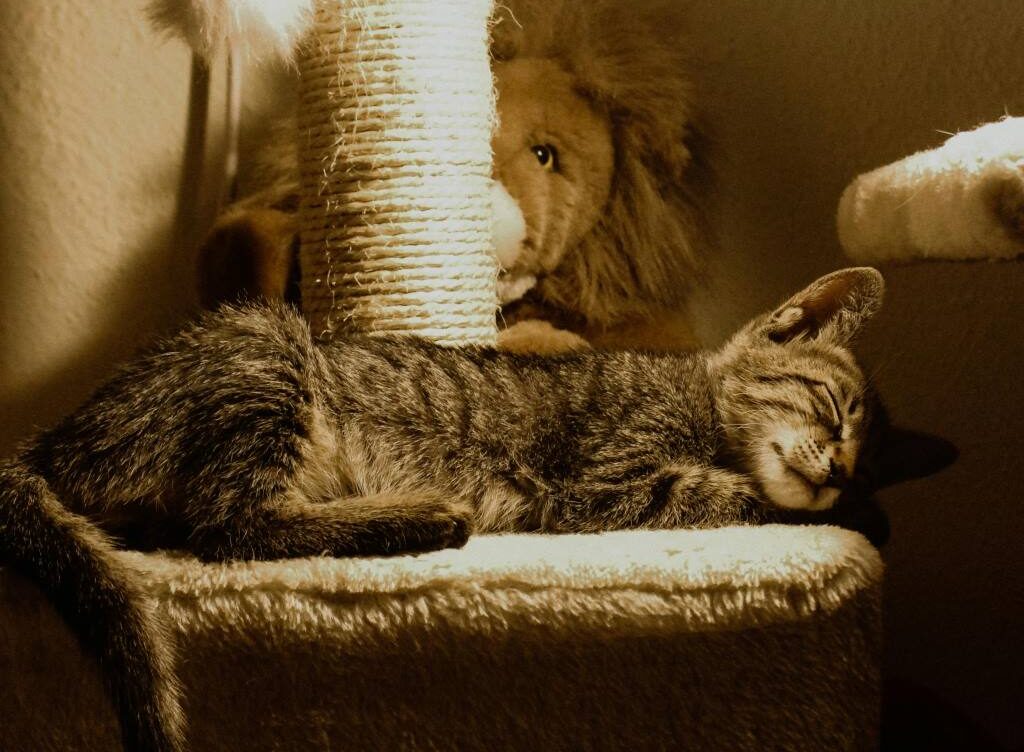
Why Does My Cat Sleep So Much? Is It Normal?
If you’ve ever noticed your cat spending most of the day napping, you might wonder if all that sleep is normal. The short answer is yes—cats are naturally inclined to sleep a lot. But why do they do it, and when should you be concerned? Let’s dive into the reasons behind your cat’s extensive snoozing habits and what’s considered normal.
Understanding a Cat’s Sleep Cycle
Cats sleep an average of 12 to 16 hours per day, with some even reaching up to 20 hours of rest, especially as kittens or senior cats. Their sleep patterns are influenced by their natural instincts as predators. In the wild, big cats like lions and tigers conserve energy for hunting by resting for long periods, and domestic cats retain this same behavior.
Cats experience both light sleep and deep sleep cycles. About 75% of their rest is in a light dozing state, allowing them to wake up quickly if needed. The other 25% is deep sleep, which is crucial for growth, healing, and overall well-being.
Why Do Cats Sleep So Much?
Several factors contribute to a cat’s extended sleeping schedule:
1. Instinctive Behavior
Even though house cats don’t have to hunt for food, their biological instincts still drive them to conserve energy. Sleeping helps them stay ready for bursts of energy when it’s time to play or eat.
2. Age-Related Sleep Needs
Kittens and senior cats tend to sleep more than young adult cats. Kittens need extra sleep for growth and development, while older cats rest more due to reduced energy levels and potential age-related conditions.
3. Weather Influence
Ever notice your cat sleeping more on rainy or cold days? Just like humans, cats may become sleepier in certain weather conditions, preferring to stay cozy and warm rather than being active.
4. Boredom or Lack of Stimulation
If your cat doesn’t have much to do, they may resort to sleeping out of boredom. Providing interactive toys, climbing structures, and engaging playtime can help keep them mentally and physically active.
5. Digestive Rest
After a meal, cats often sleep to aid digestion. This behavior is linked to their wild ancestors, who would rest after a hunt to digest their food properly before their next burst of activity.
When to Be Concerned About Your Cat’s Sleep
While a cat’s extended sleep schedule is generally normal, sudden changes in sleeping habits could indicate a problem. Watch out for these signs:
- Increased Lethargy – If your cat sleeps more than usual and seems less interested in play, food, or social interaction, it could signal an underlying health issue.
- Sudden Restlessness – If your cat is awake more than usual, pacing, or unable to settle, it might be experiencing pain or discomfort.
- Changes in Eating or Drinking Habits – A shift in sleep accompanied by loss of appetite or excessive thirst may point to an illness that requires veterinary attention.
- Unusual Noises or Breathing Issues – Snoring can be normal in some cats, but if your cat has labored breathing while sleeping, it could indicate respiratory problems.
How to Support Healthy Sleep for Your Cat
- Create a Comfortable Sleeping Area – Cats love cozy spots, so provide soft bedding in a quiet, warm place.
- Encourage Play and Exercise – Engage your cat in play sessions during the day to ensure they have enough activity before bedtime.
- Monitor Diet and Routine – A consistent feeding schedule and a balanced diet contribute to overall well-being and regular sleep patterns.
- Regular Vet Checkups – Routine health checkups help identify any underlying issues that may affect your cat’s sleep.
Final Thoughts
If your cat sleeps a lot, don’t worry—it’s a natural and necessary part of their life. However, being attentive to changes in their sleep habits can help you detect potential health concerns early. As long as your cat is eating, playing, and behaving normally when awake, their extended snoozing sessions are just part of their feline nature!
